新概念一Lesson121-122
- 格式:doc
- 大小:45.00 KB
- 文档页数:4
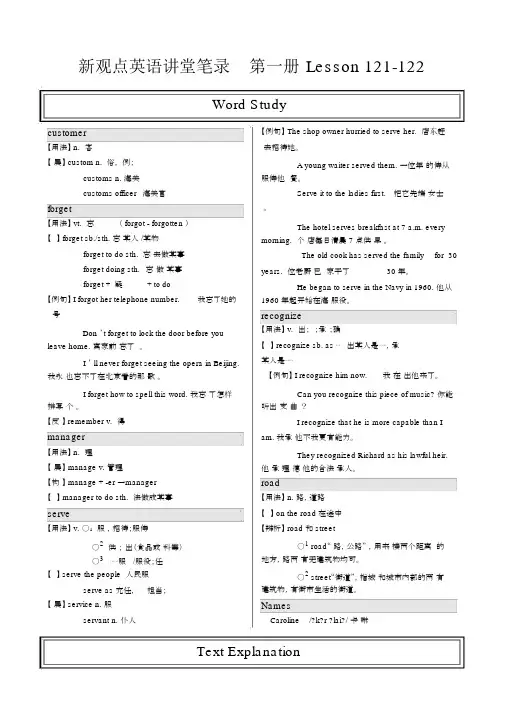
新观点英语讲堂笔录第一册Lesson 121-122Word Studycustomer【用法】 n. 客【展】 custom n. 俗,例;customs n. 海关customs officer海关官forget【用法】 vt. 忘(forgot - forgotten)【】 forget sb./sth. 忘某人 /某物forget to do sth. 忘去做某事forget doing sth.忘做某事forget + 疑+ to do【例句】 I forgot her telephone number.我忘了她的号Don ’t forget to lock the door before you leave home. 离家前忘了。
I ’ ll never forget seeing the opera in Beijing. 我永也忘不了在北京看的那歌。
I forget how to spell this word. 我忘了怎样拼写个。
【反】 remember v. 得manager【用法】 n. 理【展】 manage v. 管理【构】 manage + -er →manager【】 manager to do sth. 法做成某事serve【用法】 v. ○1服,招待;服侍○2供;出(食品或料等)○3⋯⋯服 /服役;任【】 serve the people 人民服serve as 充任,担当;【展】 service n. 服servant n. 仆人【例句】 The shop owner hurried to serve her. 店东赶去招待她。
A young waiter served them. 一位年的侍从服侍他餐。
Serve it to the ladies first.把它先端女士。
The hotel serves breakfast at 7 a.m. every morning. 个店每日清晨 7 点供早。
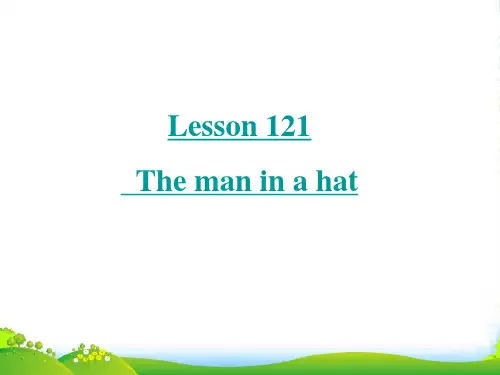
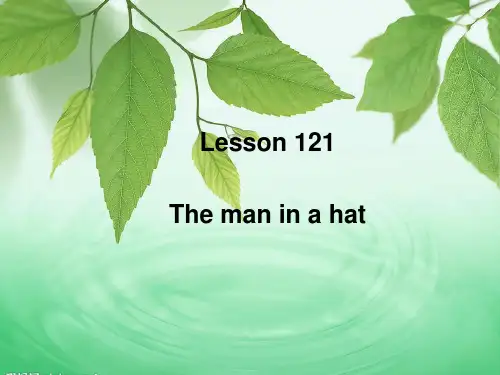

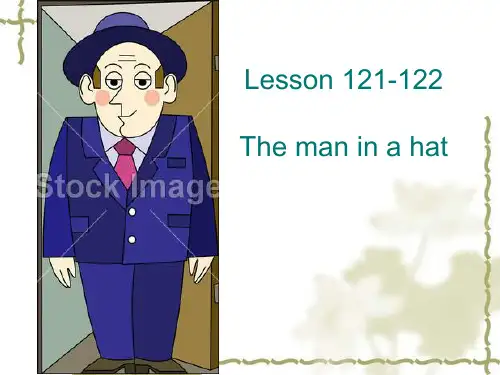
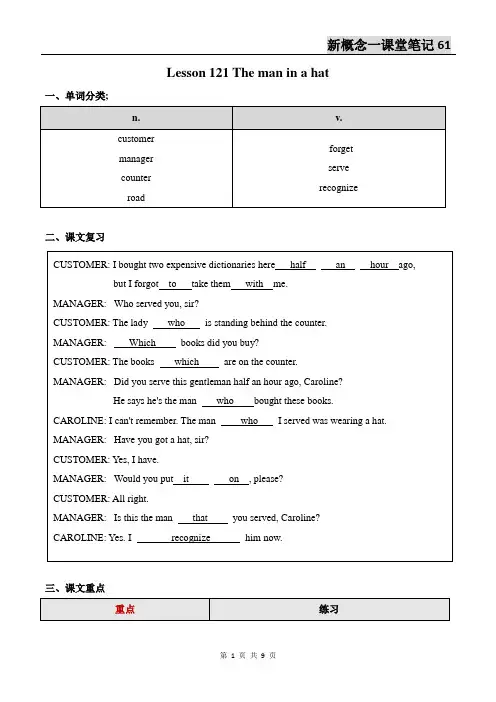
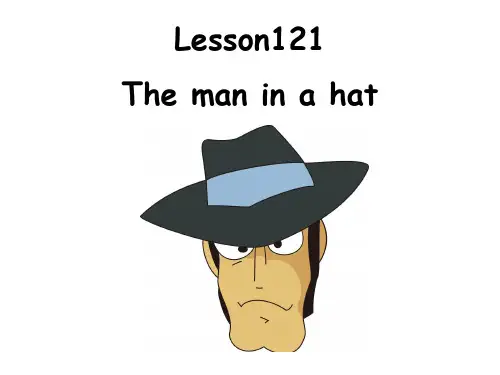
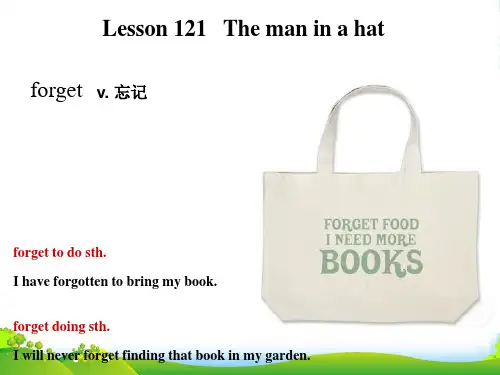
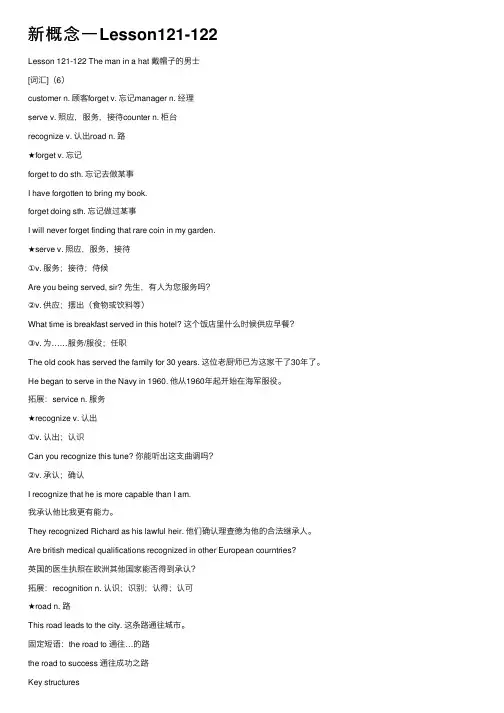
新概念⼀Lesson121-122Lesson 121-122 The man in a hat 戴帽⼦的男⼠[词汇](6)customer n. 顾客forget v. 忘记manager n. 经理serve v. 照应,服务,接待counter n. 柜台recognize v. 认出road n. 路★forget v. 忘记forget to do sth. 忘记去做某事I have forgotten to bring my book.forget doing sth. 忘记做过某事I will never forget finding that rare coin in my garden.★serve v. 照应,服务,接待①v. 服务;接待;侍候Are you being served, sir? 先⽣,有⼈为您服务吗?②v. 供应;摆出(⾷物或饮料等)What time is breakfast served in this hotel? 这个饭店⾥什么时候供应早餐?③v. 为……服务/服役;任职The old cook has served the family for 30 years. 这位⽼厨师已为这家⼲了30年了。
He began to serve in the Navy in 1960. 他从1960年起开始在海军服役。
拓展:service n. 服务★recognize v. 认出①v. 认出;认识Can you recognize this tune? 你能听出这⽀曲调吗?②v. 承认;确认I recognize that he is more capable than I am.我承认他⽐我更有能⼒。
They recognized Richard as his lawful heir. 他们确认理查德为他的合法继承⼈。
Are british medical qualifications recognized in other European courntries?英国的医⽣执照在欧洲其他国家能否得到承认?拓展:recognition n. 认识;识别;认得;认可★road n. 路This road leads to the city. 这条路通往城市。
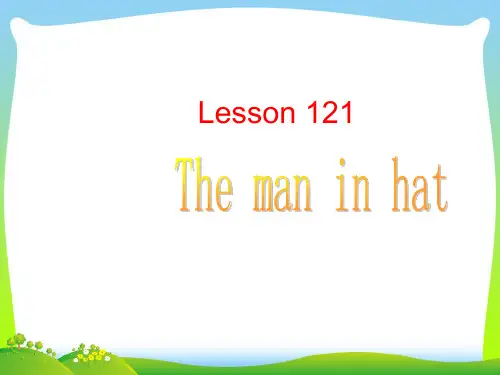
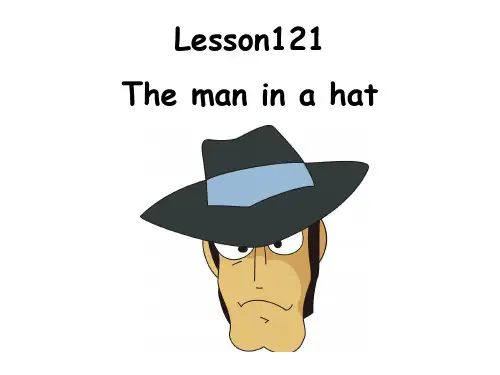
Lesson 121-122 The man in a hat 戴帽子的男士[词汇](6)customer n. 顾客forget v. 忘记manager n. 经理serve v. 照应,服务,接待counter n. 柜台recognize v. 认出road n. 路★forget v. 忘记forget to do sth. 忘记去做某事I have forgotten to bring my book.forget doing sth. 忘记做过某事I will never forget finding that rare coin in my garden.★serve v. 照应,服务,接待①v. 服务;接待;侍候Are you being served, sir? 先生,有人为您服务吗?②v. 供应;摆出(食物或饮料等)What time is breakfast served in this hotel? 这个饭店里什么时候供应早餐?③v. 为……服务/服役;任职The old cook has served the family for 30 years. 这位老厨师已为这家干了30年了。
He began to serve in the Navy in 1960. 他从1960年起开始在海军服役。
拓展:service n. 服务★recognize v. 认出①v. 认出;认识Can you recognize this tune? 你能听出这支曲调吗?②v. 承认;确认I recognize that he is more capable than I am.我承认他比我更有能力。
They recognized Richard as his lawful heir. 他们确认理查德为他的合法继承人。
Are british medical qualifications recognized in other European courntries?英国的医生执照在欧洲其他国家能否得到承认?拓展:recognition n. 认识;识别;认得;认可★road n. 路This road leads to the city. 这条路通往城市。
固定短语:the road to 通往…的路the road to success 通往成功之路Key structuresCUSTOMER: I bought two expensive dictionaries here half an hour ago, but I forgot to take them with me. MANAGER: Who served you, sir?CUSTOMER: The lady who is standing behind the counter.MANAGER: Which books did you buy?CUSTOMER: The books which are on the counter.MANAGER: Did you serve this gentleman half an hour ago, Caroline?He says he's the man who bought these books.CUSTOMER: I can't remember.The man who I served was wearing a hat.MANAGER: Have you got a hat, sir?CUSTOMER: Y es, I have.MANAGER: Would you put it on, please?CUSTOMER: All right.MANAGER: Is this the man that you served, Caroline?CUSTOMER: Y es. I recognize him now.Text[课文注释]1.The man in a hat 戴帽子的男士英语中,除了wear外,还可以用in和dress表示人的穿戴。
The man who is in black suit is my teacher2.Why didn’t Caroline recognize the customer straight away?为什么卡罗琳没有马上认出那位顾客?3.I bought two expensive dictionaries here half an hour ago, but I forgot to take them with me.(1)half an hour 半个小时——an hour half 一个半小时(2)时间段+ago …之前,常用在一般过去时中(3)forget to do sth.表示“忘了做某事”,them指两本字典。
(4)take sth with sb 某物带在某人身上,注意是先物后人。
4.Who served you, sir?如果Who、What等疑问代词做主语的话,省略助动词,但是如果做宾语的话,那么助动词不可以省略,如:Who served me? 谁接待了我。
Who did he serve? 他接待了谁。
5.The lady standing behind the counter.在定语从句中,如果从句是进行时态,而且关系代词做主语的话,关系代词和be动词都可以省略。
完整的句子应该是:The lady who is standing behind the counter served me.其中who is standing behind the counter是一个以关系代词who引导的定语从句,修饰限定词the lady。
6.The man who I served was wearing a hat.(1)who I served为定语从句,修饰the man,由于被修饰的名词the man在定语从句中是动词served的宾语,因此关系代词应该用宾格形式whom,但在口语中往往用主格who。
(2)wear a hat 戴着帽子比较:wear穿(表示状态);put on穿上(强调动作)7.Would you put it on?(1)Would yo u…?句型,指“请您…好吗?”,委婉客气地表达方法。
(2)put it on,戴上它。
这里的it指 a hat,以避免重复。
put on是“戴上”、“穿上”的意思。
如果它的宾语是一个名词,这个名词可放在put on之后,也可放在put和on之间。
如果是代词,就必须放在put和on 之间。
如:Put on your coat.= Put your coat on. 穿上外衣。
但只能说:Put it on. 把它穿上。
拓展:put on穿上,其反义词:take off脱下,摘下四、Grammar focus定语从句概念:定语从句像形容词一样起修饰作用,但位于所修饰的名词之后。
定语从句由关系代词引导,紧跟在它所修饰的成分后面。
关系代词who,whom与that修饰人,which与that修饰东西。
关系代词指代从句的主语或宾语,同时又充当连接词,把从句和主句连接起来。
1、关系代词:who, whom, whose, which, that①(先行词)人+ who/that + 动词(作主语)The man who has white hair is Mr. White.②(先行词)人+whose + 名词+ 动词(作定语)I have a friend whose father is a teacher.③(先行词)人+ who/whom/that + 及物动词/不及物动词+ 介词(做宾语)The man we met is my uncle.④(先行词)物+ which/that + 动词(作主语)which是指人以外的生命或没有生命的东西This is the bird which always sings at night.⑤(先行词)物+which/that + 主语+ 及物动词(作宾语)This is the letter I received yesterday.2、定语从句中的省略①当关系代词代表主语并且从句中的谓语动词是(现在)进行时时态时,关系代词及助动词be均可省略②如果关系代词在从句中作动词或介词的宾语,关系代词往往可以省略。
定语从句可用介词结尾。
③如果关系代词在从句中作介词的宾语,且介词提前了,介词后的关系代词只能加whom(人)/which(物),不能用that。
The woman standing behind the counter served me.That’s the ship we traveled on.That’s the man I told you about.Lesson 122 Who(whom),which and thatKey to written exercisesA1 This is the car which the mechanic repaired yesterday.2 He is the man whom I invited to the party.3 These are the things which I bought yesterday.4 He is the man who came here last week.5 He is the policeman who caught the thieves.6 She is the nurse who looked after me.7 She is the woman whom I met at the party.8 I am the person who wrote to you.B1 Who met him? That woman?Y es, she's the woman who met him.2 Who sat there? That man?Y es, he's the man who sat there.3 Who made it? That woman?Y es, she's the woman who made it.4 Who read it? That man?Y es, he's the man who read it.5 Who shut it? That man?Y es, he's the man who shut it.6 Who took it? That woman?Y es, she's the woman who took it.7 Who told me? That man?Y es, he's the man who told me.8 Who saw me? That woman?Y es, she's the woman who saw me.C1 Whom did you see? That man?Y es, he's the man whom I saw.2 Whom did you telephone? That woman?Y es, she's the woman whom I telephoned.3 Whom did you invite? That man?Y es, he's the man whom I invited.4 Whom did you take to the cinema? That man?Y es, he's the man whom I took to the cinema.5 Whom did you find in the garden? That man?Y es, he's the man whom I found in the garden.6 Whom did you drive to London? That woman?Y es, she's the woman whom I drove to London.7 Whom did you hear? That woman?Y es, she's the woman whom I heard.8 Whom did you remember? That man?Y es, he's the man whom I remembered.。